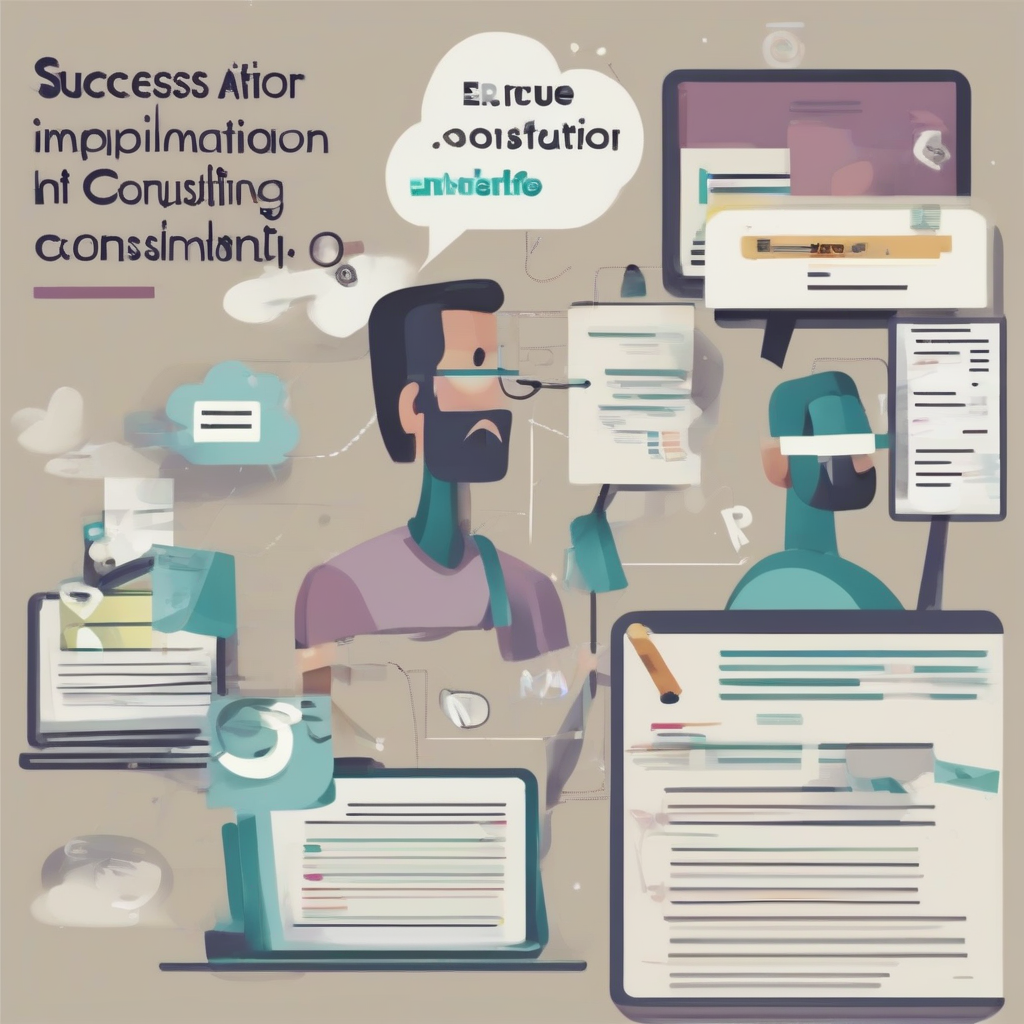The Ultimate Guide to Choosing the Best ERP System for Your Business

The Ultimate Guide to Choosing the Best ERP System for Your Business
An Enterprise Resource Planning (ERP) system is a suite of integrated applications that businesses use to manage and automate their critical business processes. From finance and accounting to supply chain management and human resources, ERP systems can help streamline operations, improve efficiency, and boost profitability.
However, with so many different ERP systems on the market, choosing the right one for your business can be a daunting task. To help you make an informed decision, we've compiled this comprehensive guide covering everything you need to know about ERP systems, including:
- Understanding ERP Systems and their Benefits
- Key Features of an ERP System
- Types of ERP Systems
- Factors to Consider When Choosing an ERP System
- Top ERP System Providers
- Implementing and Integrating an ERP System
- Best Practices for ERP System Success
- The Future of ERP
Understanding ERP Systems and their Benefits
An ERP system acts as a central hub for all your business data and processes, providing a single source of truth across different departments. This centralized approach eliminates data silos, improves communication, and enables better decision-making.
Here are some key benefits of implementing an ERP system:
- Improved Efficiency: Automation of tasks and processes reduces manual effort, streamlines workflows, and increases productivity.
- Enhanced Visibility: Real-time access to data provides a comprehensive view of business operations, enabling better planning and control.
- Increased Accuracy: Automated data entry and validation minimize errors, ensuring data accuracy and reliability.
- Better Collaboration: Shared data and workflows facilitate better communication and collaboration across departments.
- Cost Savings: Streamlined operations, reduced errors, and improved efficiency can lead to significant cost savings.
- Improved Decision-Making: Data-driven insights and real-time analytics support informed decision-making.
- Enhanced Customer Satisfaction: Improved efficiency and accuracy can lead to faster response times, better service, and increased customer satisfaction.
- Compliance and Security: ERP systems can help businesses comply with industry regulations and maintain data security.
Key Features of an ERP System
Modern ERP systems offer a wide range of features and functionalities to support various business processes. Some key features include:
- Financial Management: General ledger, accounts payable, accounts receivable, budgeting, forecasting, and financial reporting.
- Supply Chain Management: Procurement, inventory management, warehouse management, production planning, and order fulfillment.
- Human Resources Management: Payroll, employee benefits, time and attendance tracking, performance management, and talent acquisition.
- Customer Relationship Management (CRM): Sales, marketing, customer service, and relationship management.
- Project Management: Project planning, resource allocation, task management, and project reporting.
- Business Intelligence (BI): Data analytics, dashboards, and reporting tools for informed decision-making.
- Mobile Access: Mobile apps allow users to access and manage data on the go.
- Cloud Computing: Cloud-based ERP systems offer flexibility, scalability, and affordability.
- Integration: ERP systems can integrate with other business applications and software.
Types of ERP Systems
ERP systems can be categorized based on their size, industry focus, and deployment model.
- Small and Medium-Sized Businesses (SMBs): SMB ERP systems are designed for businesses with limited resources and smaller operations.
- Enterprise-Grade ERP: Enterprise-grade ERP systems cater to large organizations with complex business processes and global operations.
- Industry-Specific ERP: These systems are tailored for specific industries, such as manufacturing, healthcare, or retail.
- On-Premise ERP: On-premise systems are hosted on the company's own servers and require significant upfront investment.
- Cloud-Based ERP: Cloud-based systems are hosted by a third-party provider and accessed via the internet, offering lower costs and greater flexibility.
Factors to Consider When Choosing an ERP System
Choosing the right ERP system is crucial for business success. Here are some key factors to consider:
- Business Needs and Requirements: Identify your business processes, data requirements, and desired functionalities.
- Industry Focus: Consider ERP systems specifically designed for your industry to address unique challenges and requirements.
- Budget: ERP systems vary in cost, so consider your budget constraints and ROI.
- Scalability: Choose an ERP system that can grow with your business as it expands.
- Integration: Ensure the ERP system can integrate with your existing applications and software.
- User Friendliness: The system should be easy to use and navigate for all employees.
- Implementation and Support: Consider the time and resources required for implementation and the level of support offered by the vendor.
- Security: Data security is paramount, so ensure the ERP system offers robust security features.
- Vendor Reputation: Research the vendor's track record, customer reviews, and support services.
Top ERP System Providers
The ERP market is dominated by several prominent vendors, each offering a range of solutions and features. Here are some of the leading ERP system providers:
- SAP: A global leader in enterprise software, known for its comprehensive suite of ERP solutions.
- Oracle: Another major player in the ERP market, offering a wide range of cloud and on-premise solutions.
- Microsoft Dynamics 365: A cloud-based ERP system that integrates with other Microsoft products.
- Infor: Specializes in industry-specific ERP solutions for manufacturing, distribution, and other sectors.
- Epicor: Offers cloud and on-premise ERP solutions for manufacturing, distribution, and retail.
- NetSuite: A cloud-based ERP system designed for growing businesses.
- Sage: Provides a range of ERP solutions for businesses of all sizes.
- Acumatica: A cloud-based ERP system that offers flexible and customizable solutions.
- Odoo: An open-source ERP system with a wide range of modules and functionalities.
Implementing and Integrating an ERP System
Implementing and integrating an ERP system is a complex process that requires careful planning and execution.
- Define Business Requirements: Clearly define your business goals, processes, and data requirements.
- Select an ERP System: Evaluate different ERP systems based on your business needs and budget.
- Project Planning: Develop a detailed implementation plan, including timelines, resources, and milestones.
- Data Migration: Transfer data from your existing systems to the new ERP system.
- Training: Provide comprehensive training to users on how to use the new system.
- Go-Live: Launch the new ERP system and monitor its performance closely.
- Post-Implementation Support: Ensure ongoing support and maintenance to address any issues or upgrades.
Best Practices for ERP System Success
To maximize the benefits of your ERP system, follow these best practices:
- Engage Key Stakeholders: Involve all relevant departments and stakeholders in the implementation process.
- Clearly Define Business Processes: Document and streamline your business processes before implementing the ERP system.
- Data Quality: Ensure accurate and complete data migration to ensure the system's effectiveness.
- Change Management: Effectively manage the change process to minimize user resistance and ensure successful adoption.
- Continuous Improvement: Regularly review and optimize your ERP system to ensure it meets your evolving business needs.
The Future of ERP
The ERP landscape is constantly evolving with advancements in technology and changing business needs. Some key trends shaping the future of ERP include:
- Artificial Intelligence (AI): AI-powered features are being integrated into ERP systems to automate tasks, improve decision-making, and enhance customer experiences.
- Cloud Computing: Cloud-based ERP solutions continue to gain popularity due to their flexibility, scalability, and affordability.
- Internet of Things (IoT): Integration with IoT devices enables real-time data capture and analysis, improving operational efficiency.
- Mobile and User-Friendly Interfaces: User-friendly mobile apps provide access to ERP data and functionalities from anywhere.
- Personalized Experiences: ERP systems are becoming more personalized to meet the specific needs of individual users and departments.
What's Your Reaction?

















